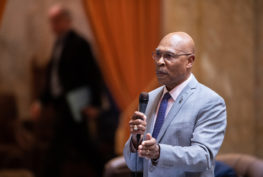OLYMPIA – A bill designed to expand access to broadband services in rural communities throughout the state was approved Thursday by the Senate Energy, Environment and Technology Committee.
Senate Bill 5935, sponsored by Sen. Tim Sheldon, D-Potlatch, creates a new state Office on Broadband Access, launches an advisory group and directs it to identify barriers and opportunities for superfast Internet and 5G service. The measure also provides funding for immediate action on deployment. The measure is cosponsored by the committee’s chair, Sen. Reuven Carlyle, D-Seattle.
“Superfast broadband service is just around the corner, and we need to make sure rural communities are not left behind as new technologies are deployed,” Sheldon said. “Access to high-speed service is just as important in rural areas as it is in the state’s biggest urban markets. This legislation will help ensure everyone shares in the benefits high-speed service will provide.”
Carlyle added: “Everyone is in favor of high quality, affordable broadband but we continue to have too many small communities and rural areas without quality service. Sen. Sheldon has taken strong action to kick deployment of broadband into high gear for the 15 percent of our state population without service. I’m excited to partner together to get this important bill to the governor’s desk.”
The committee’s vote Thursday sends the bill to the Senate Ways & Means Committee.
The new Office on Broadband Access, under the governor’s office, would coordinate public and private efforts for broadband access and deployment. It would develop goals for high-speed broadband service and identify underserved areas of the state. The legislation sets a target of at least 25 mbps download speed and 3 mbps upload speed, to be increased as technology advances.
The broadband office would establish a competitive grant program for local governments and tribes seeking to build broadband infrastructure in underserved areas of the state. Funding would come from existing taxes paid by telecommunications providers and federal grants. The office is directed to consider tax incentives for commercial providers deploying new technology in rural areas. The advisory group would make recommendations on a statewide rural broadband strategy.
Under the bill, the Kitsap County Public Utility District would be allowed to offer internet services where commercial services are inadequate or not available. Cities of more than 5,000 people would be required to develop ordinances setting standards for deployment of new small-cell technology, and generally would be barred from requiring land-use permits. The broadband office would develop a model ordinance for use by local governments.
Sheldon and Carlyle were recognized in December by the Association of Washington Cities for their work on the broadband issue. Sheldon noted the governor’s support for rural broadband efforts.
“All of us recognize the importance of broadband to this state’s economic development,” Sheldon said. “None of us want this state to be divided between internet ‘haves’ and ‘have-nots.’ ”



